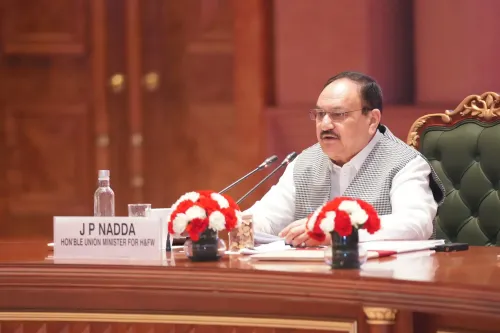How is RBI Easing Forex Norms to Support Exporters Amid Global Challenges?

Synopsis
Key Takeaways
- RBI extends forex repatriation period to 3 months for IFSC accounts.
- Compliance requirements for small-value exporters are relaxed.
- New guidelines streamline reconciliation in EDPMS and IDPMS.
- RBI reviews ECB regulations to simplify borrowing processes.
- Updated regulations aim to enhance ease of doing business.
Mumbai, Oct 1 (NationPress) The Reserve Bank of India has recently opted to relax foreign exchange management regulations to facilitate smoother payment processes for exporters. This includes a significant extension in the timeframe for repatriating forex earnings, addressing the increasing uncertainties in global trade.
The Central Bank has opted to extend the repatriation period from one month to three months for foreign currency accounts maintained in IFSC within India. This initiative aims to motivate Indian exporters to establish accounts with IFSC Banking Units and enhance forex liquidity in the IFSC. Amendments to these regulations will be announced shortly, as mentioned in an official statement.
In January 2025, the RBI had allowed Indian exporters to create foreign currency accounts with banks located outside India for the realization of export proceeds. The funds in these accounts can be utilized for import payments or must be repatriated by the end of the following month from the date the funds are received.
For merchanting trade transactions (MTT), the RBI has now increased the forex outlay period from four months to six months. This relaxation is expected to assist Indian merchants in overcoming challenges faced in efficiently completing their business transactions while maintaining profitability. The amendments to regulations will be communicated soon, as per the RBI.
The rationale behind this step is that global uncertainties in trade are causing supply chain disruptions, making it difficult for Indian merchants to fulfill their contractual obligations timely, according to the statement.
Additionally, the RBI has moved to relax compliance requirements for small-value exporters and importers.
To simplify the process for exporters and importers dealing with low-value goods and services, the RBI has decided to streamline the reconciliation process in the Export Data Processing and Monitoring System (EDPMS) and Import Data Processing and Monitoring System (IDPMS). Under the new guidelines, bills can be reconciled and closed by an AD bank in EDPMS or IDPMS, based on a declaration from the relevant exporter or importer, indicating that the amount has been realized for a shipping bill or paid against a Bill of Entry, for entries valued at INR 10 lakh or less.
This revised procedure will also allow AD banks to reduce the realizable value of bills based on such declarations. This move is anticipated to alleviate the compliance burden on small-value exporters and importers while enhancing the ease of doing business. The new directives will be issued shortly, according to the statement.
The RBI has also initiated a review of existing provisions under the Foreign Exchange Management (Borrowing and Lending) Regulations, 2018, with the aim of rationalizing and simplifying the regulations governing External Commercial Borrowings (ECB).
Following this review, a revised framework is proposed to expand the eligible borrower and lender base, rationalize borrowing limits, adjust average maturity period restrictions, remove borrowing cost restrictions for ECBs, reassess end-use restrictions, and simplify reporting requirements. The draft framework will be released soon.
Furthermore, the RBI has announced the revision of regulations regarding the establishment of Branch Offices, Liaison Offices, or Project Offices in India. The existing regulations, initially issued in 2016, have undergone a comprehensive review.
The updated regulations are principle-driven, granting more authority to AD banks and reducing compliance burden, thereby further enhancing the ease of doing business in India. The draft regulations will be shared soon, as stated in the official statement.









